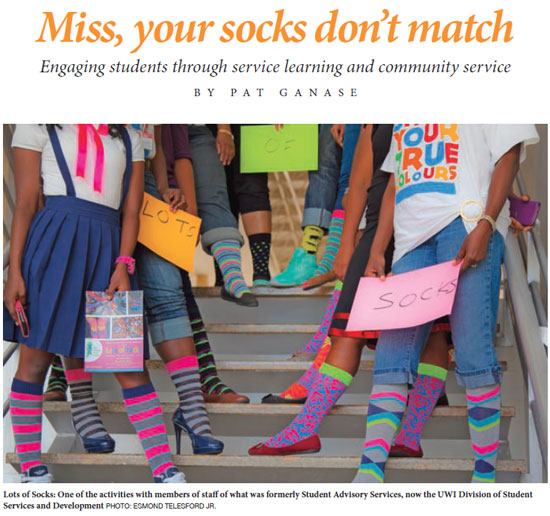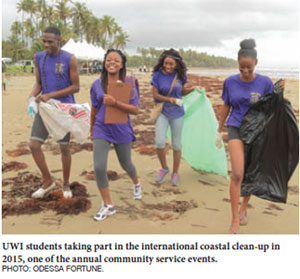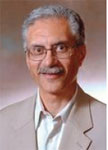
 One day in 2015, Shilohna Phillanders wore mismatched socks to work. She persuaded her colleagues in the UWI Division of Student Services and Development to wear mismatched socks to bring awareness to the genetic “mismatch” that causes Down Syndrome. One day in 2015, Shilohna Phillanders wore mismatched socks to work. She persuaded her colleagues in the UWI Division of Student Services and Development to wear mismatched socks to bring awareness to the genetic “mismatch” that causes Down Syndrome.
“It was a fun exercise, and easy for people to do. There was an overwhelming turnout. And this allowed the discussion for awareness,” Phillanders remembers the day with surprise and satisfaction. This event was a part of a broader campaign at a national level.
“Getting people to step outside their selves and their comfort zones” seems to be an effective first step for students to engage with society through selfless giving. It is one technique that may be useful to bring young people to the core concept of service learning and community engagement in the arsenal of a cross-functional team under the purview of the Deputy Principal of the UWI, Professor Rhoda Reddock.
Reddock believes that the role of the university is “to develop leadership and commitment, and graduate human beings who are strong in their disciplines but who also have the competencies required to be good and useful citizens with a sense of social responsibility and social justice.”
Phillanders, community engagement liaison in the Division of Student Services and Development, is the point person for the Community Engagement Programme, particularly the community service component. Since 2011, she is the principal link between NGOs, CBOs and students.
“Engagement with organisations like the Cyril Ross Home, Adult Literacy Tutors Association (ALTA), Nature Seekers, Habitat for Humanity, as well as mentorship programmes such as GoodStart and SUMMON, have been going on for years. We are in the process of solidifying and structuring relationships; providing assistance for student-based causes, communications such as the call for volunteers, and coordination and record-keeping for semester-long or ad hoc (one-day) programmes.”
Building a Student Conscience
A database of students and their engagements, and of agencies or companies participating in service learning and community engagement, is being built. And as more students come to see service learning as a vital feature of their growth and development, there is need to engage a wide variety of NGOs, CBOs and even government agencies or companies whose CSR activity extends to interventions in communities as well as student internship and apprenticeship programmes.
 Lynette Joseph-Brown’s forte for collecting the evidence, collating the data and analyzing trends is the appropriate foil to Deputy Principal Rhoda Reddock’s over-arching vision for a just society through interventions such as service learning and community engagement. Joseph-Brown, through the Office of the Deputy Principal, has embarked on an exercise to win support from corporate citizens for the Service Learning and Community Engagement (SLCE) programme that will provide practice-based learning and research opportunities for students, as well as needed funds and resources for aspects of the programme in need of development; such as the database, an interactive website and tutors for courses. Lynette Joseph-Brown’s forte for collecting the evidence, collating the data and analyzing trends is the appropriate foil to Deputy Principal Rhoda Reddock’s over-arching vision for a just society through interventions such as service learning and community engagement. Joseph-Brown, through the Office of the Deputy Principal, has embarked on an exercise to win support from corporate citizens for the Service Learning and Community Engagement (SLCE) programme that will provide practice-based learning and research opportunities for students, as well as needed funds and resources for aspects of the programme in need of development; such as the database, an interactive website and tutors for courses.
As a consultant/ monitoring and evaluation specialist who has worked with UN agencies and other regional and international organizations, she brings a wealth of insight and experience to the process. (Companies interested in partnering with the UWI to participate in any aspect of SLCE are encouraged to get in touch with Joseph-Brown in the office of the Deputy Principal at the UWI.)
Across the campus, many students and staff are already involved in volunteering, mentoring and giving, through home, charities and churches. The working group that came together in 2012 to review the community engagement programme conducted a survey and presented the findings in a study titled, “Are you engaged?” Phillanders confirms that there is need for all faculties and departments to be aware of the structures being put in place to assist and encourage students in community engagement, which includes service learning, community service and community-based research.
Through this programme, all students will have opportunities to build skills, gain broad experience and enhance employability. Critical thinking, interpersonal or customer-oriented communications as well as a value system that embraces social responsibility are qualities that employers respond to, over and above certifications. So it is a win-win for all parties involved.
Structuring Another Arm of Learning
“Students and faculty are recognizing that many post-graduate programmes require evidence of community engagement on students’ transcripts. And it’s not enough to simply state the activity. We have to ensure there’s qualified supervision for students in the field to ensure authentic participation and attendance. We also want to ensure that there is learning,” says Joseph-Brown. She identifies key steps in the process as important in the achievement of the objectives: reciprocity (what is being exchanged between the organization and the student) and reflection (what does it mean; how can the exchange be improved for mutual benefit?)
Considerations for reciprocity include asking, among the pertinent institutions and the 5000 registered NGOs in Trinidad and Tobago, what are the resources they lack? Do they have the resources to provide initial training to students?”
The restructuring of the programme is overseen by the Community Engagement Advisory Committee. This Committee draws representatives from all faculties, from the student body and from the private sector and community-based organizations, for the purposes of promoting understanding and awareness of SLCE, deepening the practice and fostering linkages between faculties and organizations/corporate citizens in the wider society.
“Trinidad and Tobago is listed tenth in the 2014 World Global Index for Giving. This is an indicator of the generous nature of the people in our society. Many students want to give – time and talents – but don’t know how or where. They now have a desk and a face in Student Services. Come to Shilohna Phillanders!”
Phillanders is enthusiastic about her own path to community engagement. With a BSc in International Relations and MSc in Global Studies (with research on development issues, community development and service learning), she grew up in Interact, the school arm of Rotary, and has also been a member of the Eastern Youth Chorale, Habitat for Humanity, and recently joined the Child Welfare Association.
Joseph-Brown reminds us: “There are still many students who come to the university with one purpose in mind: to get the degree that will allow them to get the good job and earn big bucks. To those students, I encourage you to become engaged through service learning and community service. Your chances of obtaining a better job will increase.”
Phillanders added, “Many of these students may come reluctantly but they find fulfillment and satisfaction outside academic achievements. And they are hooked.” That the initial reason to participate may be because of requirements on a transcript doesn’t faze them: “It matters not how you come to us, but that you do come!”
“We need to get the language of service learning and community engagement out there… to teachers in secondary schools as a start, as well as the campus community. We need to change the culture,” says Joseph-Brown.
Benefits & Definitions
 These are December 2015 remarks from Michael Cuyjet, Ed.D. Visiting Fulbright Senior Fellow; currently supporting the Service Learning and Community Engagement programme at The UWI. These are December 2015 remarks from Michael Cuyjet, Ed.D. Visiting Fulbright Senior Fellow; currently supporting the Service Learning and Community Engagement programme at The UWI.
An important goal of the initiative is to educate students on the benefits of community engagement. To many students, the most obvious is for resume building and gaining experience for jobs after graduation. Secondary is a sense of social responsibility through service learning activities that provide (1) voluntary service and (2) practice-based use of academic knowledge. A third benefit is the development of a personal and communal sense of social justice.
The community engagement activities may be classified in three groupings:
- Service learning
Practice learning
Community-based learning
Practice-based service
Institutional outreach
- Community Service
- Active Research in the Community
Community engagement scholarship
Community-based research
Practice-led research
UWI ETC (engaging the community)
The Service Learning and Community Engagement programme is the “go to” place for students looking for service learning or community engagement.
Every year, the UWI invites NGOs, CBOs and service learning partners to appeal to students for volunteers.
The next Open Day is in October 2016.
Here are some of the current partner organizations:
- Animal Welfare Network
- Nature Seekers: turtle conservation
- Habitat for Humanity T&T
- Rotaract St Augustine
- ALTA
- Down Syndrome Family Network
- Caribbean Youth Environmental Network
- Cyril Ross Tutors for Tots
- Goodstart Mentors
- SUMMON mentors
- Raffa House
|





